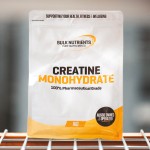Benefits of Creatine Monohydrate for Your Gym Pump

Firstly, what exactly is creatine?
Creatine is one of the most popular supplements for athletes, grounded in years of well-controlled scientific studies.
Chemically speaking, creatine is a member of the phosphagen family, a naturally occurring amino acid found in red meat and seafood, and in our muscles. Inside our muscle, around two-thirds of that creatine is in the form of phosphocreatine, with the remaining being free creatine.
During the day, about 1-2% of our muscle creatine stores are released into the urine (as a metabolic by-product) and as a result, we need around 1-3 g of creatine per day just to maintain our muscle creatine levels. But don’t stress, this can usually be achieved by food, and creatine synthesis by our liver and kidneys.
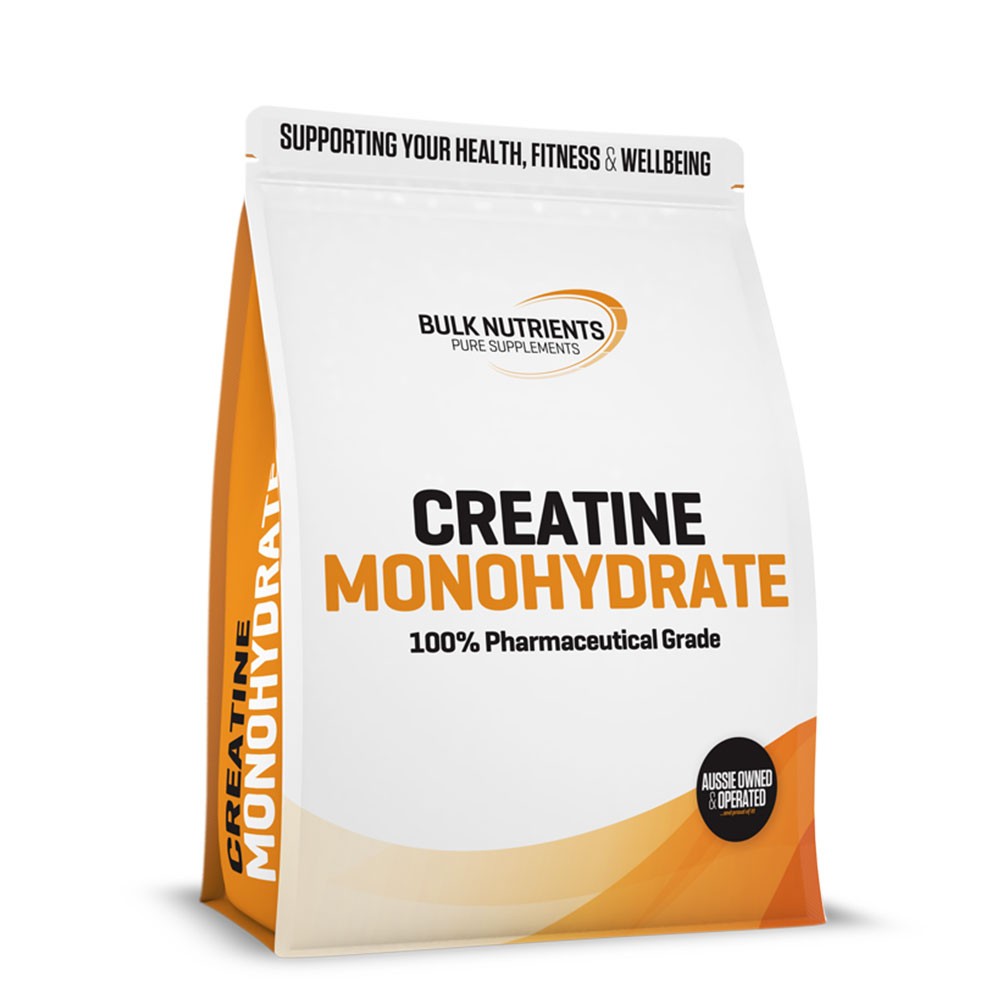
Why is creatine so popular as a supplement?
As we discussed, the majority of creatine stored in our muscle is in the form of phosphocreatine, creatine and a phosphate molecule joined together. When this molecule is broken apart (called hydrolysis) it releases a small packet of energy. This energy is then used to combine another molecule known as ATP, which is the energy source for our high-intensity training efforts.
By having more phosphocreatine in the muscle, it means we can make more ATP, especially during maximal effort exercise. Studies have consistently shown that supplementing with creatine (or increasing our phosphocreatine storage) can improve training performance, as well as enhance the adaptations from that training. The benefits don’t end there, other research within the realm indicates that creatine can improve post-training recovery, prevent injuries, help to manage body temperature levels, and even protect the nervous system during concussions. Cool huh.
How will creatine supplementation help my gym performance?
In a nutshell, creatine supplementation will increase the muscle stores of creatine and phosphocreatine, allowing an athlete to do more work over a series of sets. Improving the volume and quality of work over several sets can lead to greater gains in strength, muscle and performance.
After a period of creatine supplementation, high-intensity and repetitive exercise performance can increase by up to 10-20%! The International Society of Sports Nutrition concluded that creatine is the most effective performance supplement available to athletes in terms of increasing high-intensity exercise capacity and lean body mass.
I’m sold, what is the best way to take a creatine supplement?
In a normal day of eating including some lean meats, this might yield 1-2g of creatine. However, under these circumstances, this only saturates (fills up) our muscle cells with creatine by 60-80%.
The most effective way to increase this number - so we have more phosphocreatine for high-intensity energy production – is to consume 5g of creatine monohydrate, 4 times daily, for 5-7 days, known as a loading phase. After this loading phase, muscle creatine stores will be fully saturated, and this can then be maintained by just 1 serve of 3-5g of creatine every day. With that said, the loading phase isn’t essential to reach muscle saturation. You CAN reach muscle saturation on just 5g of creatine daily (or the maintenance dose), it just takes a little while longer.
Interesting to note, some research suggests taking your creatine with carbohydrate or protein can increase the creatine retention within the muscle! Don’t stress out if you miss one or a couple of days of dosing, studies have shown that it generally takes around 4 weeks of NO creatine supplementation before creatine stores go back to baseline.
The Australian Food standards code allows for a single daily dose of 3g of creatine, though we do note many users do take in excess of this amount, and studies are done on amounts well in excess of 3g with no ill effects.
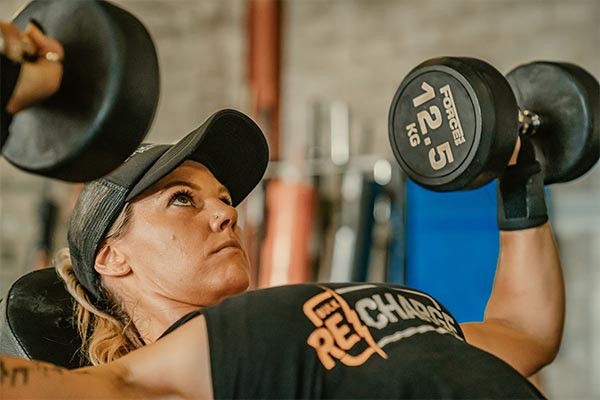
I’ve heard of other types of creatine, are they better than creatine monohydrate?
Several creatine variants have hit the market, including but not limited to creatine nitrate, creatine ethyl ester, buffered creatine, and creatine citrate. The question exists, whether any of these variants can outperform traditional creatine monohydrates.
If any of these variants were to be superior, they would need to show greater creatine retention within the muscle or undergo less degradation. Unfortunately, none of these claims has been shown in research. Given that the variants are often higher-priced, and the benefits have not been verified, stick with what we know, creatine monohydrate!
Is creatine dangerous at all?
No study has reported any adverse effects of short- or long-term creatine supplementation. If anything, performance and/or health benefits are reported, including in individuals with various diseases.
The only consistently reported side effect from taking creatine has been weight gain. For most guys and gals trying to add size, this might not even be considered a side effect! In several recent systematic reviews, several myths surrounding creatine safety have been dismissed. Creatine does not increase the risk of muscle injuries, dehydration, muscle cramping, stomach upset or damages to the kidneys.
Just to put you at ease, even 30g of creatine daily for 5 years was not associated with any kidney dysfunction! The repetition of these health findings provides solid evidence that creatine monohydrate is safe to consume and well-tolerated, and can be consumed throughout the lifetime to improve not only gains and performance but also to promote general health.
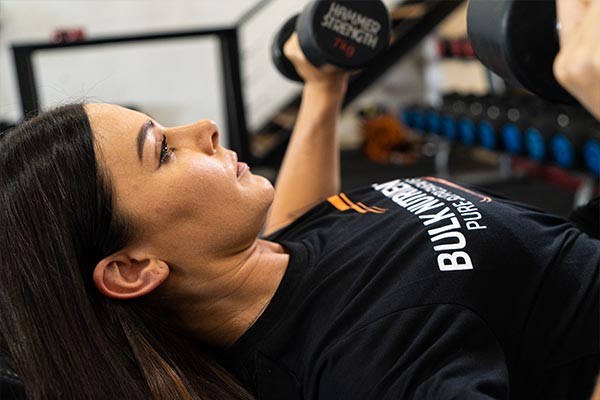
Should I avoid creatine if I’m under 18 years of age?
Some creatine critics have suggested that creatine use is unsafe in younger populations. However, it’s important to point out that this is more of a legal precaution as opposed to any scientific evidence showing that creatine shouldn’t be taken by adolescents.
As we touched on above, many studies - including those with high doses of creatine - have been conducted in many different populations, comprising those young and old. In those studies, no negative effects have been observed, while health or performance benefits almost always are.
At this stage, creatine at the recommended dose doesn’t seem to pose a health risk to individuals under 18 and is a viable tool adolescent athletes might use to improve training adaptations and reduce injury risk. We recommend checking with your teen's health care professional.
But won’t creatine make me watery?
Nope! This is one of creatine’s biggest myths. Yes, creatine supplementation is associated with increased weight gain from water retention. But this water retention occurs within the muscle cell, helping to give your muscles a fuller and rounder appearance. As long as the water isn’t being retained outside the muscle cell (extracellularly) then you won’t “look” watery or have any blurring of condition or detail.
All you need to know about creatine supplementation in a few seconds
- Creatine monohydrate is the most effective type of creatine, with the most research behind it.
- Other forms of creatine are likely more expensive, and equally or less effective.
- Creatine should be a “go-to” supplement for anyone wanting to increase high-intensity gym performance or increase lean body mass/muscle during training.
- Creatine monohydrate is safe, without side effects apart from weight gain, and generally promotes therapeutic benefits alongside the performance gains.
- Adding creatine to carbohydrates or protein may increase the retention of creatine in the muscle (where we need it).
- The most efficient way to increase muscle creatine stores is to consume 5g, 4 times daily, for 5-7 days.
- Muscle creatine stores can then be maintained with 5g daily.
- It won’t make you watery!
- Given all the known benefits, and favourable safety profile, if you wanted the best “bang for your buck” supplement to improve your gym progress, creatine monohydrate is the one!
The Australian Food standards code allows for a single daily dose of 3g of creatine, though we do note many users do take in excess of this amount, and studies are done on amounts well in excess of 3g with no ill effects.

Jackson Peos has completed a PhD at the University of Western Australia, and has a straightforward approach to nutrition and supplements.
He's completed his BSc in Sports Science, and Exercise & Health, and his BSc (Hons) in Exercise Physiology.
More about Jackson PeosReferences:
- Buford TW, et al. International Society of Sports Nutrition position stand: creatine supplementation and exercise. J Int Soc Sports Nutr. 2007;4:6.
- Burke DG, Chilibeck PD, Parise G, Candow DG, Mahoney D, Tarnopolsky M: Effect of creatine and weight training on muscle creatine and performance in vegetarians. Med Sci Sports Exerc. 2003, 35: 1946-55.
- Green AL, et al. Carbohydrate ingestion augments skeletal muscle creatine accumulation during creatine supplementation in humans. Am J Physiol. 1996;271(5 Pt 1):E821–6.
- Greenhaff PL, Bodin K, Soderlund K, Hultman E: Effect of oral creatine supplementation on skeletal muscle phosphocreatine resynthesis. Am J Physiol. 1994, 266: E725-30.
- Greenhaff PL, Casey A, Short AH, Harris R, Soderlund K, Hultman E: Influence of oral creatine supplementation of muscle torque during repeated bouts of maximal voluntary exercise in man. Clin Sci (Colch). 1993, 84 (5): 565-571.
- Greenwood M, Kreider RB, Melton C, Rasmussen C, Lancaster S, Cantler E, Milnor P, Almada A: Creatine supplementation during college football training does not increase the incidence of cramping or injury. Mol Cell Biochem. 2003, 244: 83-88.
- Harris RC, Soderlund K, Hultman E: Elevation of creatine in resting and exercised muscle of normal subjects by creatine supplementation. Clin Sci (Colch). 1992, 83 (3): 367-374.
- Hultman E, et al. Muscle creatine loading in men. J Appl Physiol (1985). 1996;81(1):232–7.
- Kreider RB, Jung YP. Creatine supplementation in exercise, sport, and medicine. J Exerc Nutr Biochem. 2011;15(2):53–69.
- Kreider, R.B., Kalman, D.S., Antonio, J. et al. International Society of Sports Nutrition position stand: safety and efficacy of creatine supplementation in exercise, sport, and medicine. J Int Soc Sports Nutr 14, 18 (2017).
- Poortmans JR, Francaux M: Long-term oral creatine supplementation does not impair renal function in healthy athletes. Med Sci Sports Exerc. 1999, 31: 1108-1110.
Related Blogs

Why Exercise Is So Important
Posted by Dayne Hudson
Estimated reading time: 5 minutes
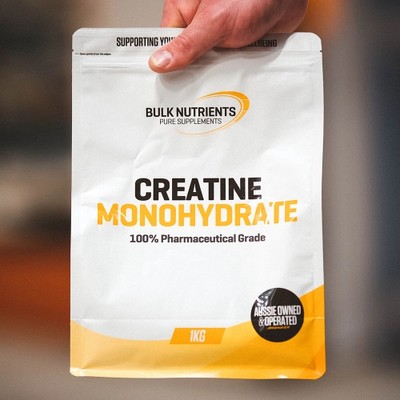
Creatine Monohydrate - Benefits, Usage and Product Information
Posted by Nick Telesca
Estimated reading time: 4 minutes
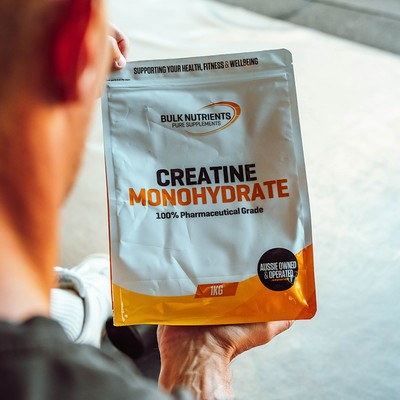
How to Cycle Creatine
Posted by Ben Crowley
Estimated reading time: 15 minutes
